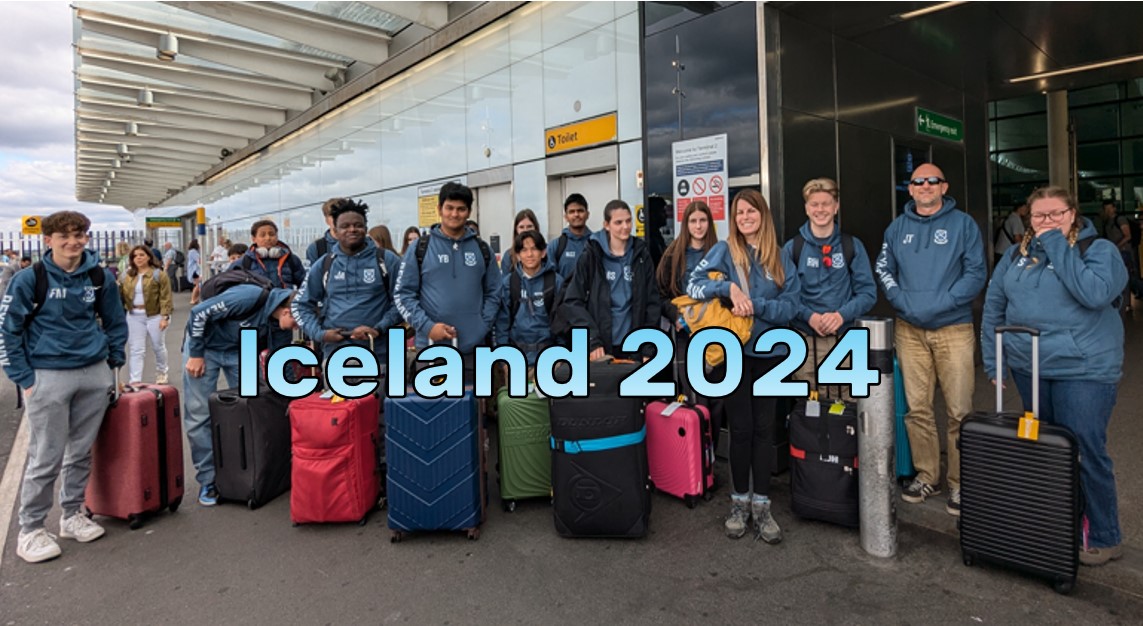Geography
Subject Vision
Geographers are inspired, inquisitive and fascinated about the World and its people.
Iceland 2024
Click on the image below to watch a video of our recent trip to Iceland.
Key Stage 3 Curriculum Overview
|
|
Year 7 |
Year 8 |
Year 9 |
|
Aut.1 |
What is geography? |
Natural Hazards- Earthquakes |
Climate Change |
|
Aut.2 |
Map Skills
|
Natural Hazards- Volcanoes |
Climate Change Antarctica enquiry |
|
Spr.1 |
Africa- What are the challenges and opportunities facing Africa? |
Weather and Climate including Microclimate enquiry. |
Asia- China’s rising economy |
|
Spr.2 |
Africa- What are the challenges and opportunities facing Africa? |
Weather and Climate- focus on Russia.
|
Asia- India’s rising economy |
|
Sum.1 |
Environmental Geography- Tourism |
Ecosystems |
Coasts |
|
Sum.2 |
Environmental Geography- Tourism and the Environment. Flatford and Dedham enquiry. |
Ecosystems. Colchester zoo enquiry |
Coasts - Pathways |
Where does this subject lead me?
At KS4 Geography is an options subject. There has never been a more important time to study Geography. GCSE Geography explores the challenges faced by human beings and aims to identify solutions for all our futures.
The skills taught in Geography at Key Stage 3 are valuable for a wide range of other subjects, including:
- Business
- Geography
- History
- Religious Studies
Key Stage 4 Curriculum Overview
|
|
Year 10 |
Year 11 |
|
Aut.1 |
Changing environments- Coasts including Walton on the Naze trip |
Changing Places, Changing economies- Development |
|
Aut.2 |
Changing places, Changing economies- Global Cities |
Environmental Challenges- Ecosystems and how they function. Ecosystems Under threat Desertification |
|
Spr.1 |
Environmental Challenges- Water Security |
Changing environments- Rivers |
|
Spr.2 |
Fieldwork |
Changing environments- Weather and Climate/Climate Change |
|
Sum.1 |
Changing places, changing economies- Urban/rural, leisure |
Exam revision and skills |
|
Sum.2 |
Changing places, Changing economies- Development |
Exam revision and skills |
Where does this subject lead me?
The new Geography GCSE provides an excellent basis for A Level both in Geography and a range of other subjects including Biology, Chemistry, Physics, Economics, Sociology and Politics.
Employers, Sixth Form Colleges and Universities value the important range of transferable skills that geography delivers. Indeed, geography has one of the highest graduate employment rates of any subject. It is broad, giving a breadth of study; it teaches fieldwork skills, teamwork, data analysis and it gives students a truly global outlook in an increasingly interdependent world.
Key Stage 5 Curriculum Overview
|
Y12 |
Paper 1- Physical Geography |
Paper 2- Human Geography |
Non Examined Assessment |
|
Aut.1 |
Desert Environments |
Population and the Environment |
|
|
Aut.2 |
Desert Environments |
Population and the Environment |
|
|
Spr.1 |
|
Changing Places Global Systems and Governance |
|
|
Spr.2 |
|
Changing Places Global Systems and Governance |
NEA -Fieldwork |
|
Sum.1 |
|
|
NEA- Fieldwork |
|
Sum.2 |
|
|
NEA- Write up |
|
Y13 |
Paper 1- Physical Geography |
Paper 2- Human Geography |
Non Examined Assessment |
|
Aut.1 |
Water and Carbon |
|
Write-up |
|
Aut.2 |
Water and Carbon |
|
Write-up |
|
Spr.1 |
Hazards |
Revision |
|
|
Spr.2 |
Hazards |
Revision |
|
|
Sum.1 |
Revision |
Revision |
|
|
Sum.2 |
|
|
|
Where does this subject lead me?
The world needs geographers. It is a multi-disciplined subject that allows geographers to develop an overview that specialists frequently miss – the geographers are able to see the wood because they are not too absorbed by individual trees. That means they are well placed to develop the strategy needed to confront the world's global problems. It also makes the subject very employable.
Further Advice
- videos of people who are working in jobs that use Geography at icould.
- example university degree courses and careers leading from this subject
- advice on applying for a university course in Geography
- general advice on applying for University / UCAS
- For advice on apprenticeship courses, click here.
Careers Information
Geography is a great subject to support a range of careers: working in the environment, travel & tourism, international charities, retail, town planning.
Green Careers: This is a significant growth sector with a wide variety of roles. Check out the Green Careers Hub to find out more.
You can watch a great series of videos of young people who are working in jobs that use Geography on the BBC Bitesize website
For example careers leading from this subject, click here.
Other Information
Parent\Carer Advice for GCSE
We know that Parents/Guardians may be nervous about supporting Geography GCSE students at home but you can play a vital role in supporting your child to achieve a good grade. We have created the attached guide to working with your child at home with some helpful advice and tips. The video explores these in more detail and shows you how to use the supporting resources.
Please contact us if you need any more information.

